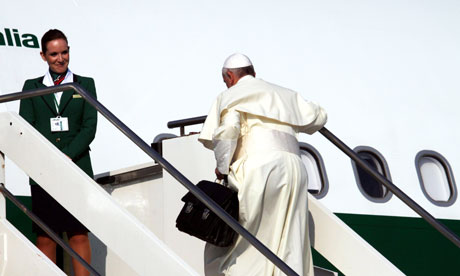 Brazil continues to be the country with the largest number of Catholics, 123 million. But if half a century ago nearly all of the population was Catholic, in the following decades the percentage decline has been very stark. From 92 percent of Brazilians in 1970 to 65 percent in 2010. Vice versa there has been a substantial rise, over the same span of time, in the number of Protestants, from 5 to 22 percent. In absolute terms, while the Catholics have stood still for twenty years at a little over 120 million, in spite of the increase in the population, the Protestants are still increasing. From 26 million in 2000 they have risen to 42 million in 2010.
Brazil continues to be the country with the largest number of Catholics, 123 million. But if half a century ago nearly all of the population was Catholic, in the following decades the percentage decline has been very stark. From 92 percent of Brazilians in 1970 to 65 percent in 2010. Vice versa there has been a substantial rise, over the same span of time, in the number of Protestants, from 5 to 22 percent. In absolute terms, while the Catholics have stood still for twenty years at a little over 120 million, in spite of the increase in the population, the Protestants are still increasing. From 26 million in 2000 they have risen to 42 million in 2010.By "Protestants" are meant not so much the Lutheran, Calvinist, Methodist Churches, those of the "historical" stock, which make up less than a fifth of the total, but mainly the Pentecostal and Evangelical Churches, some of which - like the Universal Church of the Kingdom of God and the God is Love Pentecostal Church - were born in Brazil itself.Over the past few decades the followers of other religions have also increased, in particular those of the Afro-Brazilian Candomblé and Umbanda. From 6 million in 2000 they have become 10 million in ten years.And those affiliated with no religion have also grown, including the agnostics and atheists. In 1970 they were fewer than one million. In 2010 15 million. All of these changes apply in a roughly equal way to both men and women, both educated and less educated. They are more pronounced in the segment of the population under the age of 50. But above all they impact the cities much more than the countryside. While in the rural areas Catholicism continues to be embraced by 78 percent of the population, the figure is only 62 percent in the cities, where the Pentecostals and Evangelicals reap the most conversions and the agnostics and atheists are on the rise. In Rio de Janeiro, the destination of the voyage of Pope Francis, Catholics are now a minority among the citizens, just 46 percent. It comes as no surprise that the pope's objective is that of infusing into the Brazilian Church - and by extension into the Churches of Latin America - the missionary vitality capable of overturning this tendency to decline.
Link (here) to Sandro Magister's full article
No comments:
Post a Comment
Due to a high volume of spamming I have had to enable comment moderation. It may take a day to see your comment published. Respectful and thoughtful comments welcome